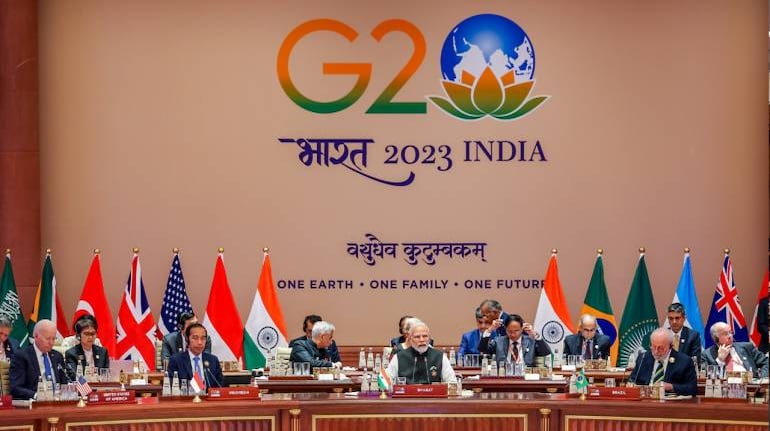



The G20 Summit held in New Delhi demonstrated how diverse the views, aspirations and interests are for disparate regions of the world. Keeping this multitude of political and economic actors focused on finding common grounds for working together on the emerging global problems is a tremendous task for any host.
Moreover, this year’s summit was complicated by the absence of the Presidents of Russia and China and the intense back-and-forth negotiations over issuance of the joint declaration.
The Old Order ChangethDespite the initial pessimism, India was successful at the end by convincing the leaders that the raison d’etre of the G20 forum is to discuss and resolve the concerns of the Global South. The practical implication of not ignoring this fundamental is the addition of the African Union as the new permanent member of the G20. This corrective action increased the weight of the Global South in the forum and ensured G20’s viability for the future as the economic centre of gravity shifts toward Africa.
This centre is currently held in the Indo-Pacific by the combined manufacturing capacity of China and emerging centres like India, Bangladesh, Vietnam and Indonesia. The latter set of countries is becoming a stronger base owing to rising manufacturing costs in China, while its available manpower is ageing.
The Covid-19 pandemic further exposed the concentration risk of investing solely in China. Consequently, the China+1 economic strategy has been unveiled to diversify the global supply chains, but it lacked a vision to connect the emerging manufacturing centres formally with the global market.
India took the initiative in the backdrop of its G20 presidency and unveiled the India-Middle East-Europe Economic Corridor (IMEC) to resolve this hurdle. For this purpose, India is partnering with the established economic powers of Europe and the Gulf states seeking to diversify their economic base from oil dependency.
Alternative To Debt DiplomacyThe partnership model stands in contrast to China’s unilateral Belt and Road Initiative which has become a conduit for dumping its excess manufacturing capacity on unsuspecting developing nations, leading to their debt traps.
However, the success of this corridor and the economic strategy underpinning it depends upon the region-wide infrastructure built to international standards. To mobilise investment in such projects, India also led a discussion on promoting the Partnership for Global Infrastructure and Investment.
This initiative, based on the principles of the Blue Dot Network, will ensure the infrastructure growth in developing countries is financially transparent and environmentally sustainable.
The best promise of this initiative is that the projects should culminate in the final benefit to the local economy and society, without which the projects tend to be exploitative and leading to social upheavals. The IMEC is being designed with an acknowledgment of this fact, which enables the local administrations wean the population off any militant tendencies towards the project and ensure better governance.
Where China ErredBoth the internal and external experiences, with the most recent example being Sri Lanka, compelled India to not only acknowledge the link between the economic and social factors but ensure they become mutually beneficial. This realisation was not new to either India or China as they began reemerging from the historical slumber.
Both sought standing up as the voice of the Global South, first to support the decolonisation efforts and then to balance the skewed economic growth of the world. Their leadership in this regard remains indispensable to this day.
They also remain steadfast in rectifying the internal defects that turned into weaknesses during the colonial times. But they differ in the approach taken for restructuring their own societies, the neighbourhood and the world at large.
China believes in radically altering the internal demographics in favour of constituting a homogenous society. A similar belief is held in a restructured world order where China rules as the undisputed hegemon.
However, its fixation on the long past of the Middle Kingdom, and the blind ambition to reimpose history has unnerved many developing countries, which demand respect to their own struggles. China has been actively undermining this shared history, leading to growing mistrust in the neighbourhood about its intentions and triggering the search for reliable, balancing partners. The elevation of the Vietnam-US bilateral relations into a comprehensive strategic partnership is a case in point.
India Reimagines Its HistoryOne should not mistake, however, that India does not contemplate its own historical position in the world order and aspires to regain it because of China’s misadventures.
However, this position is not founded on the practice of traditional zero-sum notion of realpolitik but the indigenous concept of Vasudhaiva Kutumbakam, where one’s interests are the interests of all and vice-versa. This long-held belief allowed India to overcome the limitations of political geography, a legacy of colonial history, and turning its large, heterogeneous population into a strength.
Consequently, developing countries find India’s model fitting to their own circumstances. India’s power base lies in this acceptance.
Vidya Sagar Reddy is a research analyst on outer space affairs. He tracks Indian, Chinese and American space activities. Vidya has published book chapters, and research articles in the Astropolitics and NewSpace journals. He also provided analyses for The Space Review, SpaceNews, and East Asia Forum. Views are personal, and do not represent the stand of this publication
Discover the latest Business News, Sensex, and Nifty updates. Obtain Personal Finance insights, tax queries, and expert opinions on Moneycontrol or download the Moneycontrol App to stay updated!
Find the best of Al News in one place, specially curated for you every weekend.
Stay on top of the latest tech trends and biggest startup news.